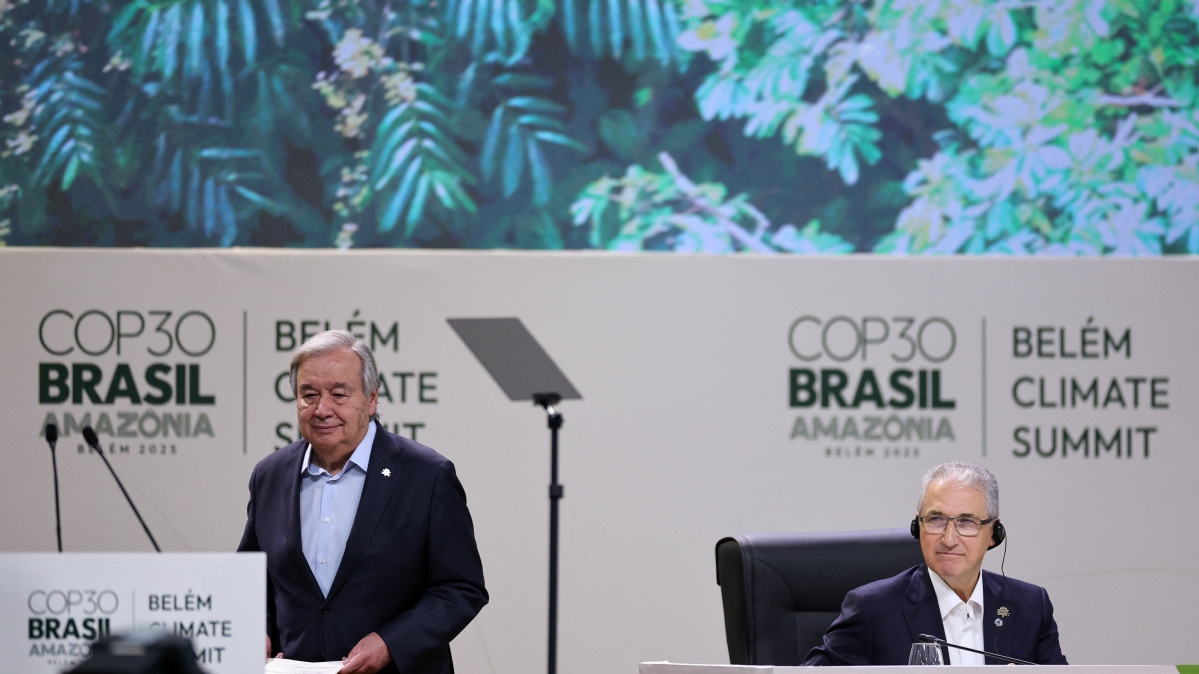From the Kremlin to Westminster: Exposing the Ruben Vardanyan lobby
How do political narratives travel from Moscow to Westminster?...

UN Secretary-General António Guterres launched a fierce criticism of world leaders for failing to keep global warming below 1.5 degrees Celsius, as Brazil hosted a summit of global leaders ahead of the COP30 climate conference in the Amazonian city of Belém.
Scientists have confirmed that the world is on course to surpass the 1.5°C threshold around 2030, risking irreversible and catastrophic climate impacts.
“Too many corporations are making record profits from climate destruction, spending billions on lobbying, deceiving the public, and blocking progress,” Guterres said. “Too many leaders remain captive to these entrenched interests.”
He noted that countries collectively spend about $1 trillion a year subsidising fossil fuels. “We can choose to lead – or be led to ruin,” he warned.
Record heat and rising concern
The COP30 conference marks three decades since global climate negotiations first began. While nations have succeeded in slowing projected emissions growth, scientists warn that current efforts are still insufficient to prevent extreme levels of warming in the coming decades.
According to the World Meteorological Organization (WMO), this year is expected to rank as the second or third hottest on record, with average temperatures through August reaching 1.42°C above pre-industrial levels, following record heat in both 2023 and 2024.
“The alarming streak of exceptional temperatures continues,” said WMO Secretary-General Celeste Saulo.
Outside the still-unfinished conference venue, a small group of Indigenous people gathered, singing and calling for the protection of forests and their communities. Meanwhile, a flotilla carrying Indigenous leaders and activists along the Amazon Basin was delayed and is expected to arrive next week.
Key absences at the summit
During the two-day leaders’ summit on Thursday and Friday, around 150 heads of state, regional leaders, and international organisations are due to deliver speeches broadcast globally. However, leaders from four of the world’s five biggest polluters — China, the United States, India, and Russia — are notably absent, with only the European Union represented at the highest level.
The United States has chosen not to send any delegation at all. Instead, senior U.S. officials were in Greece on Thursday as energy giant ExxonMobil signed a new offshore gas exploration deal. Some analysts argued that Washington’s absence could enable a more balanced dialogue.
“Without the U.S. present, we can actually see a real multilateral conversation happening,” said Pedro Abramovay, Vice President of Programmes at Open Society Foundations and a former justice minister under Brazilian President Luiz Inácio Lula da Silva.
A new space for multilateralism
Lula held bilateral meetings on Thursday with UK Prime Minister Keir Starmer, French President Emmanuel Macron, and German Chancellor Friedrich Merz, following talks the previous day with China’s vice premier and leaders from Finland and the European Union.
“In a moment when many people are proclaiming the death of multilateralism, I think there is a new space emerging — one that is not imposed from powerful countries onto poorer ones,” Abramovay said.
Brazil's climate funding push
Brazil hopes the World Leaders Summit will raise at least $10 billion towards its new Tropical Forest Forever Facility, part of a wider $125 billion goal to fund rainforest conservation and sustainable development.
China, Norway, and Germany were expected to announce contributions in Belém after Brazil made the first investment and Indonesia matched it. However, the United Kingdom — despite helping to design the fund’s framework — confirmed on Wednesday that it would not be providing financial support, a decision seen as an early setback for the initiative.
U.S. President Donald Trump said the U.S. military has enough stockpiled weapons to fight wars "forever"; in a social media post late on Monday. The remarks came hours before conflict in Iran and the Middle East entered its fourth day.
China’s Foreign Minister Wang Yi has held talks with his Russian counterpart Sergei Lavrov following recent military strikes carried out by the United States and Israel on targets in Iran, as tensions in the Middle East continue to rise.
U.S. first lady, Melania Trump chaired a UN Security Council meeting on children and education in conflict on Monday (2 March), a move criticised by Iran as hypocritical following U.S. and Israeli strikes that triggered a UN warning about risks to children.
The U.S. embassy in Riyadh was hit by two drones resulting in a limited fire and some material damage, the kingdom's defence ministry said in a post on X on Tuesday, citing an initial assessment.
Türkiye and Iran have suspended day-trip passenger crossings at their shared border, Türkiye's trade minister said Monday, as a U.S.-Israeli military campaign against Iran entered its third day.
Start your day informed with AnewZ Morning Brief. Here are the top news stories for the 4th of February, covering the latest developments you need to know.
Strikes across the Middle East are intensifying, fuelling travel disruption, driving up global energy prices and forcing diplomatic missions to shut their doors.
U.S. President Donald Trump has said the United States has a “virtually unlimited supply” of munitions and is capable of sustaining military action indefinitely, as the conflict with Iran entered its fourth day.
The United Nations has called for an investigation into a deadly attack on a girls’ primary school in Iran, which Iranian officials say has killed more than 100 children. The U.S. has said its forces “would not” deliberately target a school.
U.S. first lady, Melania Trump chaired a UN Security Council meeting on children and education in conflict on Monday (2 March), a move criticised by Iran as hypocritical following U.S. and Israeli strikes that triggered a UN warning about risks to children.
You can download the AnewZ application from Play Store and the App Store.

What is your opinion on this topic?
Leave the first comment